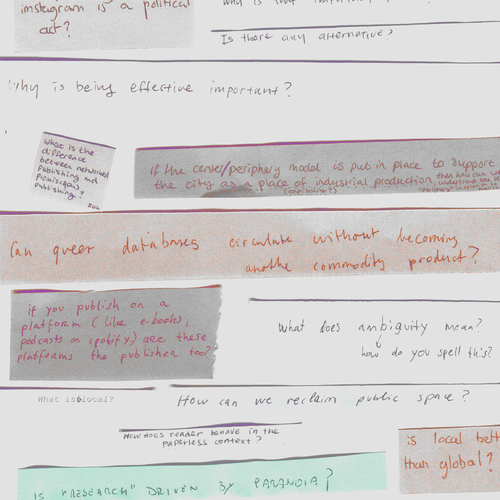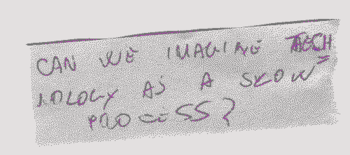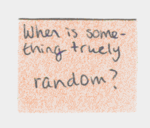User:Flo/QuestioningQuestions: Difference between revisions
m (→Output) |
mNo edit summary |
||
| (15 intermediate revisions by the same user not shown) | |||
| Line 1: | Line 1: | ||
<div style="font-family: Georgia; font-size: 14px; color:grey; | <div style="font-family: Georgia; font-size: 14px; color:grey; background-color:WhiteSmoke; padding-left:10%;"> | ||
<div style="width:70%;"> | |||
== Questioning Questions == | == Questioning Questions == | ||
A quick log on the tutorial given on 31st of January 2022 | A quick log on the tutorial given on 31st of January 2022. The images are dithered to create smaller file sizes to reduce storage capacity on this Wiki. | ||
<br> | |||
<br> | |||
<br> | |||
<br> | |||
[[File:Dithered questions.png|500px|center|The output from the tutorial]] | |||
<br> | |||
<br> | |||
<br> | |||
<br> | |||
=== Questions === | === Questions === | ||
| Line 15: | Line 26: | ||
[[File:Dither Scan 2.png|500px|center]] | [[File:Dither Scan 2.png|500px|center]] | ||
[[File:Dither Scan 3.png| | |||
[[File:Dither Scan 3.png|350px]] | |||
[[File:Dither Scan 7.png|500px | |||
[[File:Dither Scan 7.png|500px]] | |||
==== New sentences ==== | ==== New sentences ==== | ||
| Line 288: | Line 300: | ||
who is competing? | who is competing? | ||
[[File:Dither Scan 4.png|150px|center]] | |||
==== Notes on the tutorial ==== | ==== Notes on the tutorial ==== | ||
| Line 362: | Line 377: | ||
[https://theanarchistlibrary.org/library/ursula-k-le-guin-the-carrier-bag-theory-of-fiction.pdf The Carrier Bag Theory of Fiction by Ursula K Le Guin] | [https://theanarchistlibrary.org/library/ursula-k-le-guin-the-carrier-bag-theory-of-fiction.pdf The Carrier Bag Theory of Fiction by Ursula K Le Guin] | ||
</div> | |||
</div> | </div> | ||
Latest revision as of 09:19, 11 June 2022
Questioning Questions
A quick log on the tutorial given on 31st of January 2022. The images are dithered to create smaller file sizes to reduce storage capacity on this Wiki.
Questions
When Camilo, Kendal and I sat down to think of a tutorial we could do with the group we quickly came to the conclusion we all are interested in questions; how to ask questions in our project, how to formulate a question, how to have a dialogue with asking questions or deconstruct the question by seeing a question as a sentence and not as a need to give an answer.
Tutorial
Camilo and me gathered all our questions we use or have used in our research (Kendal could not attend). We deconstructed the questions into words and printed the sentences and the words and cut them into pieces. We scrambled the words of both our projects and scrambled the questions together into a words and a questions pile. Two of the participants joined remote, so we prepared a part on this pad with a list of the questions and an online pile of words. We started with our idea behind the question, how it relates to our own research. We wanted to give context to this tutorial by talking about "the bag" from Ursula K Le Guin. In The Carrier Bag Theory of Fiction (1989) she speculates on this "bag" as a starting point of humanity, to tell a story from a gatherer point of view instead of the hunter/ hero. The mix of all the questions on our research and the mixing of the words (keywords) simulates this theory; we wanted to research, deconstruct, reconstruct "our" bag of questions and merge them with all the bags of the participants. For this to happen we asked everyone to take the scraps of paper with questions and/ or words and scramble them, reformulate them or write down new questions. We asked: "¿How could you formulate these questions in a different way? Change words? Change order? Mix up different questions? Adding words from your own "bag"? Combine questions? ¿What questions come up reading these questions? Answer the question with another question?". We collected all newly formed questions in a bowl and on the pad and collectively read them out load.
Output
New sentences
These sentences were formed during the tutorial (written down in no chronological order):
IRL
Is competition a form of collaboration?
Is local better than global?
How does reader behave in the paperless context?
How can we reclaim public space?
What is the difference between networked publishing and promiscuous publishing? How are they different in movement?
Does publishing outside instagram is a political act?
If you publish on a platform (like e-books, podcast on spotify) are these platforms the publisher too?
What is glocal?
Why is being effective important?
How many seeds do you need to sow to grow a strong infrastructure, which branches will outgrow the limits of urgency?
Is "research" driven by paranoia?
Can queer databases circulate without becoming another commodity product?
What does ambiqguity mean? How do you spell this?
If the center/periphery model is put in place to support the city as a place of (capitalist)industrial production, then how can we understand the term "periphery" in relation to a publication?
Why is that important to me?
What are the dangers of a ludified smart city?
Is there any alternative?
How to balance "doing nothing" as a needed pause with "doing nothing" as a privilege?
In which language you want to translate this project?
What design mechanism does Instagram uses?
Who are behind the local publishing production usually?
What is between eco-friendly and design?
Is Instagram a precarious alternative fanzine?
Is the relation between quality and quantity the same in small publishing and big editions?
Why doesn't Nami use Instagram?
What is valuable of CMYK printing proccesses?
Who cares if I hide something?
How do festivals relate to printing?
What does insightful alternatives do?
Was M. Thatcher right?
How much do I pay for your fanzine?
How do we conceive content in digital form?
Why are we using mainstream media?
Does make sense talk about urgencies constantly?
What the fuck is urgency?
How to deal w complexity if we hate complexity?
How insightful can the language used in fanzines be to generate new worth?
Is an office community human?
What user want is being effective?
How do I balance my ego and communication?
Is contradiction a link between useful and insightful?
How an industrial production of database can be transform into a communal publication of united industries?
Shall we print stuff on our skin?
of the magic circle are blurry?
Does being cryptic encourages curiosity?
What is at stake?
How do you make connections?
What can insightful political acts amplify
Why do databases not circulate without industry profit?
How can we do critique while staying close?
How do I balance mu art and my money?
What does it mean to be open to criticism?
What could the ingredients of paper achieve to refer to books of value?
Are you responsible as a publisher on what you publish, and how?
How do you navigate yourself in websites?
Can an unaccessible text trigger news?
Can I make money with what I love?
Can you write something no sence? Or you accept the absurdity of life?
Can we imagine technology as a slow process?
Are there multiple points of view?
What is insightful? What does it mean?
Can you be the user of a book?
Effective, useful VS related, magic. Can they be synerzised?
Why does it bother me?
How can someone check if I hide sth or share everything?
How could we imagine intertwingled databases? (Ted Nelson speaking)
What is queer infrastructure?
How can we trade production?
How do you frame your question in a searching-engine?
To reach an audience is to be realistic from a publishing perspective?
What is wrong with humans?
How do you search for a question in a search engine?
What is a publisher? When are you publishing?
What audience wants is being effective?
Can we circulate process of globalization to share (or shape) quick user nature?
Does trading can amplify a boring technological website?
Should we follow instructions by a complex pattern designed to generate profits without -
Should the processes circulate me?
How think responsive architecture?
Are you gonna pay me now?
Can we accept walls btwn languages?
What is useful? What have we done that is truly useful?
If I translate this project, do you trust me?
What are code languages used in public space?
What are moments when the boundaries
What if I forget my question?
Do you have lots of friends (followers) who interested in your publication on Instagram?
When is something truely random?
How does capitalism relate to publishers publishing?
Can existence be seen as labor?
How can we create meaningful links?
What is the advantage of local audience?
Shouldn't you be resting?
What are the dangers of dystopian narratives?
What is being small-edition knowledge worth?
Is an editor an user?
What use what what?
Does paper bridge linearity to a book? Does it matter the binding structure?
How autonomous practices relate with efficiency, how does it relate with commodity?
Does printing make paper more valuable or not?
Why does everyone love riso printing?
Does anyone know wtf is going on?
What if publisher don't know/ care the editorial knowledge?
What's gonna happen when smth queer become "standard"?
What are the ingredients of a book?
Can plants collaborate with capitalism?
URL
Do I need to publish on paper?
What's the energetic cost of a digital version of the publication?
What is communicating?
who is local?
Is being local a limit?
how many times can you recycle paper?
what are the limits of language?
what makes an office?
are we recycling ideas?
why does time matter?
is our time history?
What the fuck is urgent?
Do you have a publishing platform? (Who don't?)
what is famous?
who are publication fairs for?
how can a publication be useful?
Where do you find your references?
Is Wikipedia a reference?
is an editable webpage a reference?
Why must we find references in references?
where do the origin of references end?
Why is digital the alternative for paper?
what is potential?
why do we have a preference in search engines?
Who is the judge?
who is competing?
Notes on the tutorial
After reading together all newly formed questions out loud we asked everyone from the group to share their thoughts on the tutorial.
Taken from the pad, noted by Manetta:
Interesting and easy going way that can touch upon many things that we're busy with now, both life and research, formulated not only by me but formulated by all of us.
Even though these are cut ups, there is a sense of connection in terms of discourse, it feels like the questions are formulated by one single voice. Talking in a framework that has already been started. Bouncing further. To not start from scratch.
Lot of inspiring questions made by others, some were very relatable to my own project. It helped to broaden my horizon in a time that i am thinking a lot about my own project only. I'm thinking a lot about web design these days, i'm trying to be and think more realistic these day and some questions here on the table were more philosophical which helps me to open up my own thinking. "i could think that way"
workshop as a method? Where can this method be used for? When? How and by whom?
Searching other points of view. Diffractive questioning?
Different points of view? Different ways of formulating questions? Different perspectives? Multiplicity?
This can also be a method to zoom out. Good to do this right now, at this point in the year. It feel very pleasant to not have an unexpected outcome. If you asked me to keep doing this it would be fine to me, it's very nice to do. Taking a step back also helps to be concious about which words you use to think with in a research.
Like in Clara's workshop, it really helps to have a strict framework. It also helps a lot that not all the questions need to be perfect. By continuing and formulating another and another and another questions, it is very generative.
Now i'm diving deep in diffractive methodologies, this workshop shows that my hypothesis, that the question can be a diffractive apparatus, it will let you map a pattern of possibilities. It's really beautiful to see it in practice.
Didn't you want us to track what question this question is triggered by? Is it important for you to understand which question triggered which question? On the pad this happened actually, which is interesting. There are different ways to do this. It's interesting in terms of knowing where things are coming from. But in this exercise it's also the beauty that you can get a clue where something is coming from, without directly making the relation. Because i wrote a part of the questions, i do see relations actually. But it could be nice to try to make these traces. There is something intere
"bag" as a metaphor also in relation to "bag-of-words" where the bag is a list of counted words Different understandings and imagination of a "bag", in our minds "Puka": a chaotic mix of different things, that we can use to make something out of it "addressing this topic" is a very different way of approaching a topic or working on a project "the bag you are thinking from", from where you can create associations, set priorities, etc. Also in terms of language, different languages use different rules/grammar to create a question. Spanish uses a question mark placed upside down to introduce to the reader that a line is a question. In Korean, there is no reverse verb/subject to formulate a question, you need to derive information from the context to know if a sentence is a question. Is the ? symbol the same in Korean? Yes it is. But the subject is often not used in the sentence. Is it? Yes. In Korean you can just say "Eat?" and Nami would understand that i want to ask if she wants to eat or not. In Korean, when someone calls me with my name + surname, it feels very official. People don't call me Nami, but they call me Namija. Otherwise it sounds cold and weird. And in Italian, do you use the question mark in the beginning? No. In France we only use the question mark in the end. Ref to a writer that refused to use question marks..... when you say something twice in one sentence, he felt like it was already so obvious that it is a question.
Online you're more on your own. You're more focused on the questions that you would formulate yourself. Enjoying the idea to randomly make a question, you can always find a meaning in apparent randomness. Sometimes you really don't know what to ask to yourself. We're sometimes missing to formulating questions, maybe we are not doubting enough? It helps to open up the mind and let you bump into something that you did not think about.
The fact that you could see everything on the pad took away some part of the fun. On the table the questions were more messily spread around. I expected that multiple people would formulate the same question, but this did not happen.
Next step(s)?
Write the questions down and share it with all of you.
Method for zooming out? Method for zooming in?
I would like to make an interface to navigate through the questions, making relations to the glossary where the question could speak back to. It could become a sort of annotation interface. You are not able to go to the glossary without formulating a question. They become a hypothetical conversation between words. At some point i would like the visitor/reader/user to be able to formulate their own question. It would become a way of reading. Describing something also brings the question of classification, which draws borders. To understand how i can map the glossary, i feel like i need to try it.
Enjoyed the possibility of absurdity. Nice to have space to not make sense. It creates a really interesting dynamic.
Pictures
Links
Miriam Rasch text in the frame of "Making public" research project by Institute of network cultures





